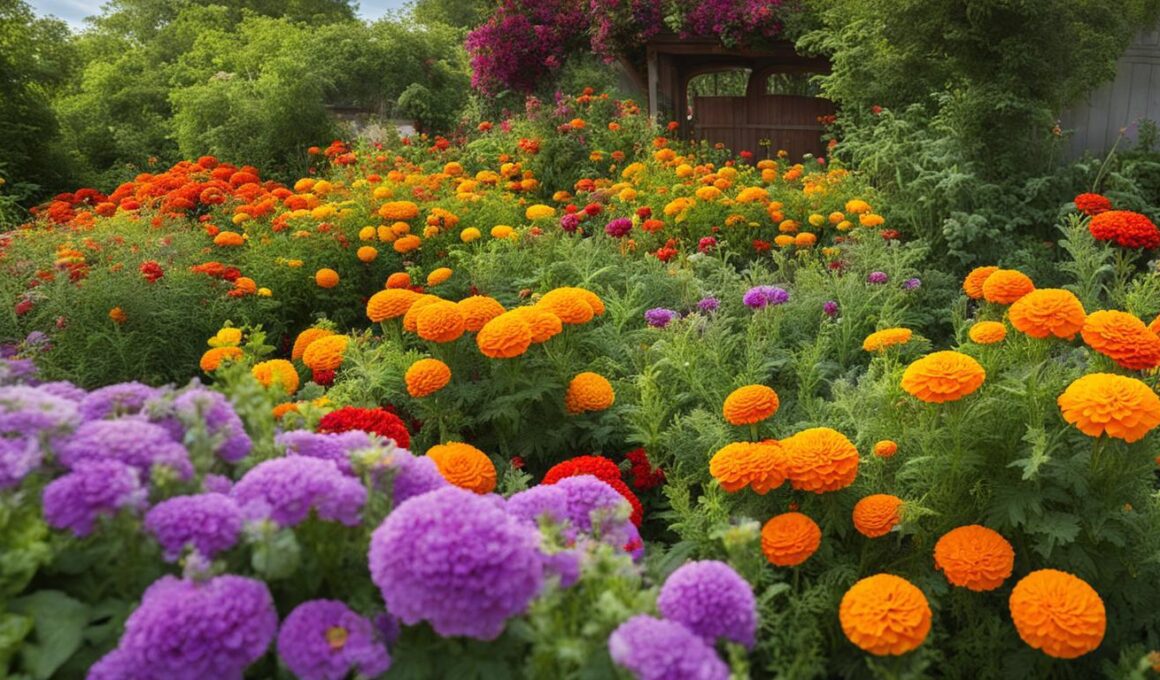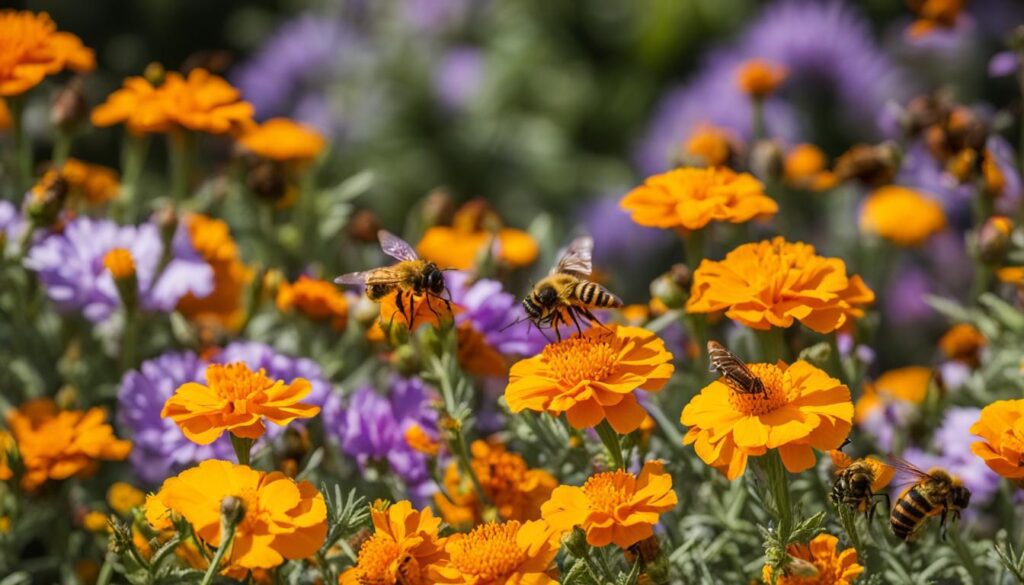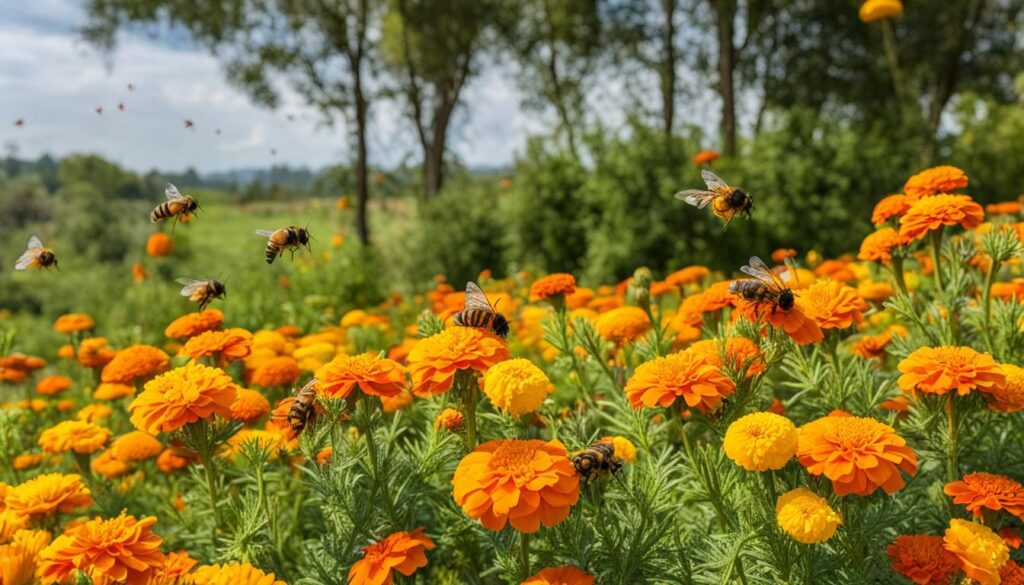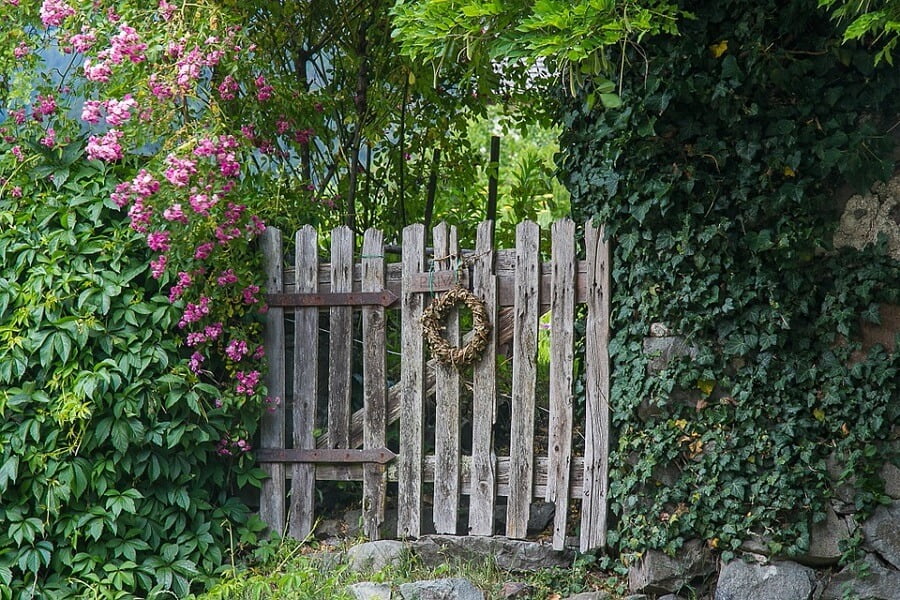Marigolds are not just beautiful flowers but also serve as excellent pollinators in the garden. They attract important pollinators like bees and butterflies, which are essential for the growth of fruits and vegetables. The benefits of marigolds extend beyond their ornamental value, making them a valuable addition to any garden.
Marigolds release a chemical that helps repel pests, such as cabbage worms and whiteflies, protecting nearby plants. Additionally, marigolds are hardy and low-maintenance, making them a great choice for any garden. Their vibrant colors and attractive blooms add visual appeal to any landscape or container garden.
Key Takeaways:
- Marigolds attract important pollinators like bees and butterflies, aiding in the growth of fruits and vegetables.
- They release a chemical that helps repel pests, protecting nearby plants.
- Marigolds are hardy and low-maintenance, making them a great choice for any garden.
- They add visual appeal to landscapes and container gardens with their vibrant colors and attractive blooms.
- Marigolds offer a natural and beautiful way to support pollinators and control pests in your garden.
The Benefits of Marigolds for Gardeners
Marigolds offer several advantages for gardeners. They are easy to grow from seeds and are drought tolerant, requiring less attention and watering compared to other annual flowers. Marigolds also self-seed, providing a new crop of flowers in the following spring. These flowers are not only attractive but also deter certain pests, such as nematodes, which can harm plant growth. Additionally, their strong scent can repel larger pests like deer and squirrels, protecting the garden.
When it comes to gardening with marigolds, their benefits extend beyond their pest-repelling properties. These vibrant flowers come in a range of colors, adding visual interest to any garden or landscape. Whether you choose the traditional orange and yellow varieties or opt for the more unique red, pink, or cream-colored blossoms, marigolds can enhance the aesthetic appeal of your outdoor space.
Furthermore, marigolds are known to attract beneficial insects like ladybugs and lacewings, which prey on common garden pests like aphids and mites. By planting marigolds alongside your vegetables or other susceptible plants, you can naturally control pest populations without relying heavily on chemical pesticides. This not only minimizes the use of harmful chemicals but also promotes a healthier, more balanced ecosystem in your garden.
Marigolds are not only beautiful, but they also offer a range of benefits that make them a valuable addition to any gardener’s toolkit. Whether you’re looking to repel pests, attract beneficial insects, or simply add a burst of color to your garden, marigolds are a versatile and reliable choice.
Table: Marigolds and Their Benefits for Gardeners
| Benefit | Description |
|---|---|
| Pest Repellent | Marigolds emit a strong scent that repels pests like deer, squirrels, and certain insects. |
| Self-Seeding | Marigolds have the ability to self-seed, providing a continuous cycle of blooms year after year. |
| Visual Appeal | With a variety of colors available, marigolds add vibrancy and beauty to any garden or landscape. |
| Attracts Beneficial Insects | Marigolds attract predatory insects like ladybugs and lacewings, which help control garden pests naturally. |
| Low Maintenance | Marigolds are easy to grow and require minimal care, making them a hassle-free choice for gardeners. |
So, if you’re considering adding marigolds to your garden, rest assured that you’ll not only enjoy their beauty but also reap the benefits they offer for pest control, natural ecosystem balance, and low-maintenance gardening.
Marigolds and Pollinators
Marigolds play a crucial role in attracting pollinators to your garden. By planting different varieties of marigolds in various colors, you can create a bloom-filled landscape or container garden that appeals to bees and butterflies. Some marigold varieties with open centers, such as Bambino, Golden Guardian, Legion of Honor, and Lemon Gems, are particularly attractive to these important pollinators.
Bees and butterflies are vital for the pollination of plants, especially fruits and vegetables. Marigolds serve as a beacon, drawing these pollinators with their vibrant colors and sweet nectar. As they collect pollen from the marigold flowers, bees and butterflies inadvertently transfer pollen to other plants, thus aiding in their reproduction. This symbiotic relationship between marigolds and pollinators helps ensure the continued growth and abundance of your garden.
Marigolds not only provide a food source for bees and butterflies but also offer them a safe haven. These flowers act as landing pads, allowing pollinators to rest and refuel before continuing their important work. By including marigolds in your garden, you create a welcoming habitat for these beneficial insects, supporting biodiversity and fostering a healthy ecosystem.
Benefits of Marigolds for Pollinators:
- Attract bees and butterflies to your garden
- Create a bloom-filled landscape or container garden
- Provide a food source and safe haven for pollinators
- Aid in the pollination of fruits and vegetables
- Support biodiversity and a healthy ecosystem
With their vibrant colors, sweet nectar, and welcoming presence, marigolds are the perfect addition to any garden looking to attract and support pollinators. By incorporating these beautiful flowers into your landscape, you not only enhance the visual appeal of your garden but also contribute to the overall health and productivity of your plants.
Marigolds as Pest Deterrents
Marigolds have long been recognized for their potential as natural pest deterrents in the garden. While they may not repel all pests, marigolds have shown effectiveness in deterring certain insects. French marigolds, in particular, contain a strongly scented terpene that can help repel whiteflies from infesting nearby tomato plants.
In addition to their scent, marigolds also attract beneficial insects that aid in pest control. This can contribute to natural pest management in the garden. By planting marigolds alongside other companion plants, you can create a diverse ecosystem that supports the presence of beneficial insects, which in turn help control pest populations.
While the effectiveness of marigolds against cabbage worms and other pests may vary, incorporating marigolds into your garden can be a proactive step towards reducing pest damage. Their vibrant blooms and low-maintenance nature make them an attractive and practical choice for gardeners looking for natural pest control solutions.
| Insect | Effectiveness of Marigolds |
|---|---|
| Cabbage Worms | Variable effectiveness |
| Whiteflies | Potentially repelled by French marigolds |
| Nematodes | No proven repelling effect |
While marigolds can be a beneficial addition to your garden for pest control, it’s important to note that they should not be solely relied upon as the sole means of defense against pests. Integrated pest management practices, such as crop rotation, proper plant spacing, and regular monitoring, should be implemented in conjunction with marigolds to maintain a healthy garden ecosystem.
Marigolds and Bees
When it comes to marigolds and bees, there is often confusion about whether these vibrant flowers repel or attract these buzzing insects. Contrary to popular belief, marigolds do not repel honeybees, which are important pollinators. In fact, honeybees are attracted to the nectar produced by marigold flowers and play a vital role in the pollination process.
However, marigolds may have the potential to deter other bee species, such as hornets and yellow jackets, which are often considered pests due to their swarming behavior and stinging. While there is no definitive scientific evidence on whether marigolds can repel these invading bee species, many gardeners have reported success in using marigolds as an insect deterrent.
It’s important to note that bees are essential for pollination, and choosing plants that attract and support a variety of bee species is crucial for biodiversity and the health of our ecosystems. While marigolds may repel certain bee species, they can still offer numerous benefits to the garden and serve as a natural deterrent for other unwanted insects.
The Potential Impact on Bee Populations
Protecting bee populations is of utmost importance, as they contribute to the pollination of a wide range of plants, including fruits, vegetables, and flowering plants. While marigolds may deter some bee species, it’s essential to focus on planting a diverse range of bee-friendly flowers and creating habitats that support their health and well-being.
“In order to support bee populations, it’s best to plant a variety of flowers that bloom at different times of the year. This way, bees have a continuous source of nectar and pollen and are less likely to rely solely on marigolds.”
– Expert Gardener
By incorporating a mix of native plants, wildflowers, and other bee-attracting flowers alongside marigolds, you can create a thriving garden that supports a diverse range of bee species and promotes pollination throughout the seasons.
| Bee Species | Attracted to Marigolds? |
|---|---|
| Honeybees | Yes |
| Hornets | Possible deterrent |
| Yellow Jackets | Possible deterrent |
Planting Marigolds for Insect Control
Marigolds are commonly used as companion plants to help deter certain insects and pests. Their pungent odor is believed to repel many pest insects, including cabbage worms and rabbits. While color may not be a significant attractor for bees, it is the scent and availability of nectar that attract them. Wasps and yellow jackets, on the other hand, are not after nectar but seek protein from other insects. Marigolds are unlikely to be of interest to these insects due to their scent and lack of nectar. While marigolds may not completely eliminate the need for other pest control measures, they can be a natural and beautiful supportive option.
When it comes to insect control in your garden, marigolds can be a valuable asset. By planting marigolds strategically, you can help deter pests and create a more pest-resistant environment for your plants. The pungent scent of marigolds is known to repel insects like cabbage worms and rabbits, making them less likely to munch on your precious crops. Additionally, marigolds are not attractive to certain insects like wasps and yellow jackets, which are more interested in protein from other insects rather than nectar.
While marigolds alone may not be able to completely eliminate the need for other pest control measures, they can certainly complement other methods and act as a natural line of defense. By incorporating marigolds into your garden, you can create a beautiful and fragrant barrier against pests, reducing the need for chemical pesticides and promoting a more environmentally friendly approach to insect control.
Do Marigolds Attract Bees or Other Pollinators?
Marigolds are not plants that repel bees, in fact, they attract them. Bees are drawn to the vibrant colors and sweet fragrance of marigold flowers. Their pollen is a valuable food source for bees, making marigolds an excellent addition to any pollinator-friendly garden.
Conclusion
In conclusion, marigolds offer a wealth of benefits to your garden. Not only are they visually appealing, but they also serve as excellent pollinators, attracting important insects like bees and butterflies. These pollinators are essential for the growth and development of fruits and vegetables in your garden.
Furthermore, marigolds play a significant role in pest control. They have the ability to deter certain insects and attract beneficial insects that help control pest populations naturally. Additionally, marigolds may help reduce nematode populations, which can harm plant growth.
Adding to their allure, marigolds are hardy and low-maintenance, making them a valuable addition to any garden. They can withstand various environmental conditions and require minimal attention. Moreover, marigolds have the ability to self-seed, ensuring a new crop of flowers in the following spring.
So, if you’re looking to enhance your garden’s pollination and pest control while enjoying a vibrant and low-maintenance flower, marigolds are the perfect choice. Embrace the benefits they bring to your garden and witness the beauty and abundance they contribute.
FAQ
Are marigolds good pollinators?
Marigolds are not pollinators themselves, but they attract important pollinators like bees and butterflies, which are essential for the growth of fruits and vegetables.
What are the benefits of marigolds for gardeners?
Marigolds are easy to grow, drought-tolerant, and low-maintenance. They also self-seed, deter certain pests, and attract beneficial insects, making them a great choice for any garden.
How do marigolds attract pollinators?
Marigolds with open centers are particularly attractive to pollinators like bees and butterflies. By planting different varieties of marigolds in various colors, you can create a bloom-filled garden that appeals to these beneficial insects.
Do marigolds repel pests?
Marigolds release a chemical that helps repel pests like cabbage worms and whiteflies. They also attract beneficial insects that help control pest populations, contributing to natural pest control in the garden.
Can marigolds repel bees?
Marigolds do not repel honeybees, which are important pollinators. However, they may have the potential to deter other bee species, like hornets and yellow jackets, which are often considered pests.
How can marigolds help with insect control?
Marigolds are commonly used as companion plants to help deter certain insects and pests. Their pungent odor repels many pest insects, while attracting beneficial insects that aid in pest control.
What are the overall benefits of marigolds?
Marigolds are not only aesthetically pleasing but also serve as effective pollinators, aid in pest control, and are hardy and low-maintenance. They offer numerous benefits to gardens and can be a natural and beautiful supportive option.











